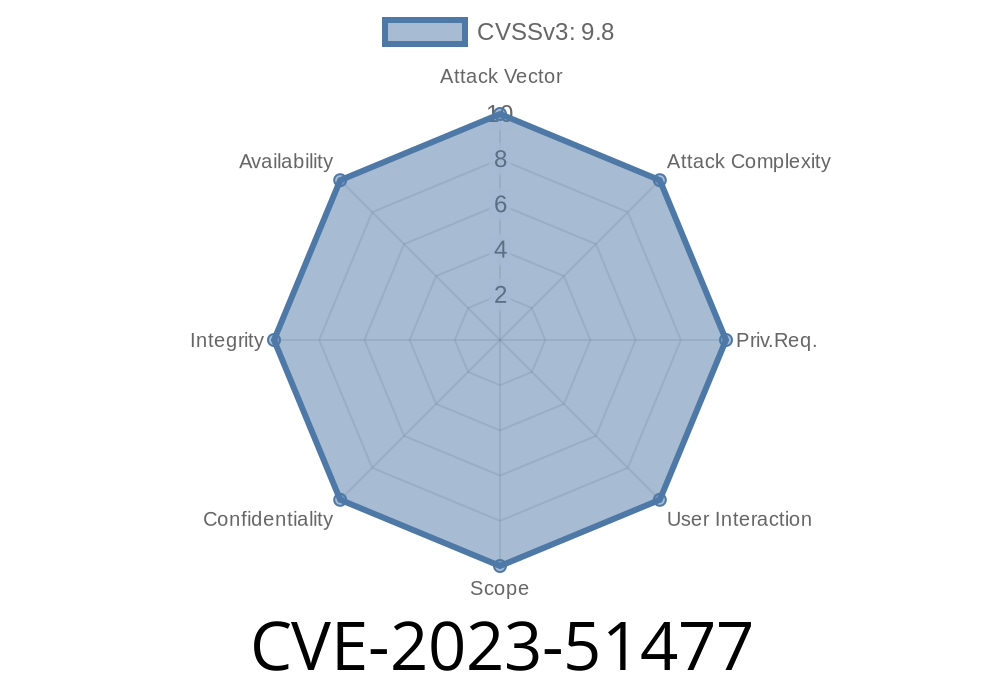Date: June 2024
Author: GPT Security Team
Introduction
In this post, we’re diving deep into CVE-2023-51477, a critical vulnerability discovered in the popular WordPress BuddyBoss Theme. This exploit revolves around improper authentication, allowing attackers to access features that should be restricted, simply because the theme’s Access Control Lists (ACLs) failed to keep users out where necessary.
Let’s break down what happened, explore sample exploit code, and provide remediation steps — all in plain, simple language.
What is BuddyBoss Theme?
BuddyBoss Theme is a popular WordPress theme tailored for online communities, membership sites, and social learning. It’s deployed on thousands of websites, ranging from niche forums to enterprise learning management systems.
About the Vulnerability
ID: CVE-2023-51477
Type: Improper Authentication / Access Control
Affected Versions: *Unknown initial* through 2.4.60
Patch Available: Yes (see remediation below)
Technical Details
This vulnerability is categorized as “Accessing Functionality Not Properly Constrained by ACLs.” In plain terms, it means BuddyBoss Theme failed to check if a user is allowed to access certain features or information.
Usually, themes and plugins have "capability checks" to ensure that, for example, only admins can perform sensitive actions. In this CVE, one or more sensitive AJAX or REST API endpoints were left open to any user—including guests (not logged in)—due to missing authentication checks.
Vulnerable Function Example
The specific function or endpoint isn’t disclosed in public advisories. However, based on the type of issue, let's take a look at what a typical vulnerable function *might* look like in BuddyBoss:
// A MOCKUP of a vulnerable BuddyBoss Theme AJAX handler
// In functions.php or a plugin file
add_action('wp_ajax_export_users_data', 'bboss_export_users_data');
function bboss_export_users_data() {
// MISSING: if ( !current_user_can('manage_options') ) { wp_die(); }
// Exports all users' data -- should be admin-only!
$users = get_users();
foreach($users as $user){
echo $user->user_email . '
';
}
wp_die();
}
// Register for non-logged-in users
add_action('wp_ajax_nopriv_export_users_data', 'bboss_export_users_data');
What’s the problem?
There is no check to make sure the user is an admin! Any user (even a guest) can call the export_users_data AJAX action and get a full list of emails or other data.
Proof-of-Concept Exploit
NOTE: Replace example.com with your target site.
curl -X POST "https://example.com/wp-admin/admin-ajax.php"; \
-d "action=export_users_data"
This command will trigger the exposed function, allowing the collected data to be dumped to the attacker—even without being logged in!
*This is a simplified illustration. The real vulnerable function could differ, but this demonstrates the root problem: missing authentication before critical action.*
References & More Info
- NVD Entry for CVE-2023-51477
- BuddyBoss Changelog (Security Fixes)
- Wordfence Disclosure
- OWASP Broken Access Control
Remediation
Upgrade Immediately:
BuddyBoss has patched this vulnerability as of version 2.4.61. If you are running any version up to 2.4.60, update *now*.
wp_die('You are not allowed to do this!');
}
Conclusion
CVE-2023-51477 is an example of how a simple oversight—forgetting an authentication check—can expose an entire website to risk. If you’re running BuddyBoss Theme, it’s crucial to stay up-to-date and audit your customizations for secure coding best practices.
Timeline
Published on: 04/24/2024 17:15:46 UTC
Last modified on: 06/04/2024 17:20:16 UTC
